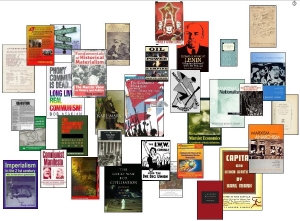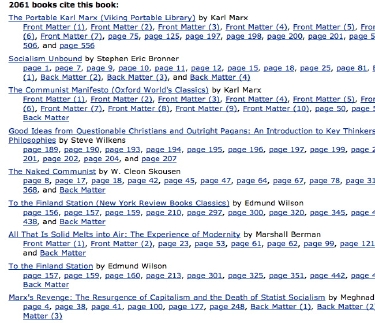danah boyd has written a response to all the conversation generated by her 24 june blog post in which she tried to interpret usage patterns of facebook and myspace in terms of class. i’m not particuarly interested in the original post or her substantive responses but she makes some interesting comments about the difference between traditional academic writing and blogging.
as i see it, danah sadly bends over backward to distinguish the blog post from serious academic writing. she says, “In academic writing, I write for posterity. In my blog, I write to get an issue off my chest and to work things out while they are still raw.” what i find significant though is that this blog post has, according to danah, generated thousands of quotes and references. either the blogosphere is just filled with meaningless back and forth banter or the blog post launched what could be or could have been (if handled better) a significant public debate. for argument sake, let’s assume the latter, in which case, it seems a shame that there is such a strong tendency to devalue a new form of writing which is proving to be such a powerful engine of serious discussion.
yes, blogs are not the same as formal academic papers, but i’m not sure that is the same as saying that they can’t be as valuable within the universe of scholarly discourse.
can we imagine a universe where blogging is not automatically put into a “not-really-up-to-par-for-the-academy” category.
Author Archives: bob stein
ideal ulysses, part two
it occured to me as i read the comments to yesterday’s post that i left out a key element in the equation -? the ovearching vision that determines what gets included in the ideal Ulysses and how. ideally this vision will be a creative amalgam of the perspective of the great teacher, the enquiring reader and the canny editor/producer.
this trinity may seem obvious but i think the question of how to balance the power between the three is something we don’t really know much about. to put differently, if in the print world the hierarchy of AUTHOR/reader has been fiercely protected by those whom it favors, the promise of the networked book to upset these relations is just that, a promise. that will be the case until we come up with new schema powerful enough to be the foundation of a real transformation* (see footnote at bottom of the post)
i think perhaps an interesting next step would be to sit in on classes with some of the great teachers of Ulysses -? the ones who make the book come alive for their students. i’d like to see what characteristics are common to all and which different. then we could think about how to take the essence of this experience into an ideal version. note, that even if the answer in the end is that for teachers to work their magic they need to be live, in front of an audience, then the question for me becomes, how do we get that into a networked book?
So please if you took a great course in Ulysses or know of anyone who did, comment here or send me a note at bob@futureofthebook.org.
_____________________
* footnote -? many years ago a group of us were trying to imagine the encyclopedia of the future. we saw it in part as the ultimate teacher/tutor who knew everything about everything, who waited in the background till called, and who then was able to engage you at your level on any question you put forth. this view, while valid, placed 100% of the value on learner-initiated activities. it seems in retrospect as if foolishly we completely discounted the ability of the teacher/mentor/knowledgeable companion to raise interesting questions which could start the learner off in unexpected but perfectly wonderful directions.
ideal ulysses, part one
ok. i’ll admit it. i haven’t read Ulysses yet. sadly, there are a lot of important books in that category, but i have a particular excuse for this one. Ulysses is daunting for me. for starters, it’s pretty much been at or in contention for the top spot in the canonstakes for as long as i can remember, but more importantly, I’m very sure that if i just go at the text by itself i’ll feel helpless, knowing that i’m only grasping a small, and possibly even least interesting, bit of the whole. so i’m waiting for my dream edition, the highlights of which include:
• a beautifully rendered text, perhaps even with help and guidance of a master typographer.
• a low-footprint interface that the reader can dismiss at will, leaving only the text on the page with all buttons etc. hidden from view. since the book will have copious annotations, it’s important that the reader can hide and reveal whichever graphic indicators indicate the presence of annotation.
• a complete audio version. ideally this might be a recording done with the best actors specifically for this edition, but it could also be assembled from readings done over the years. in any case key passages should be represented by multiple readings. and of course the text and readings should be tied to each other, allowing you to read and listen at the same time.
• a thorough word and phrase glossary with a snappy and intuitive mechanism for getting to it directly from the text.
• the explanation of references -? literary, linguistical, historical, personal, social, political. ideally each of these categories would be represented in some unique way, so that readers can turn specific layers on or off at will. these annotations will be comprised of text, audio, and/or video.
• close readings of key passages by experts from multiple interesting viewpoints.
• for these last two, i’m sure i want there to be a mechanism for people to question and challenge the original authors and each other. the genius of the wikipedia for me is that by revealing the back and forth of an article as it evolves, it brings us closer to the truth -? or at least improves our understanding of the complexity of the factors underlying the subect at hand. so, we’ll need a good way, which i imagine will involve some form of benevolent moderation, of enabling a conversation to emerge in the myriad margins of the work. enabling comments that refer to multiple points in the expanded text is crucial to get beyond the constraints of current commenting schemes which tend to restrict you to paragraph, page or whole.
thoughts -? objections, agreements, additions, subtractions?
sophie blog and tutorial
noonebelongsheremorethanyou
josh portway sent a note today saying “i have found the future of the book” which included a link to a delightfully charming site made by Miranda July to tout her new book of short stories. It’s interesting to note how the low-tech mode of expression works so brilliantly in the high tech context of the browser.
sophie alpha version is up
As promised, an alpha version of Sophie is available here. As it says on the download page . . . To be honest we’re betwixt and between about releasing Sophie now. On the one hand, it’s definitely not ready for prime-time and we’re not particularly happy about releasing software with so many bugs, no documentation and incomplete features; on the other hand, Sophie is real and promises to be fantastic . . . so we didn’t want people to think it was vaporware either.
the situation with sophie
Someday this week we”ll post an alpha version for people to try out — check here for the announcement. This version won’t have a standalone reader and has lots of bugs but the file format is solid and you can start making real books with it. Our schedule for future releases is as follows.
June — a more robust version of the current feature set
August — a special version of Sophie optimized for the OLPC (aka $100 laptop or XO) in time for the launch of the first six million machines
September — a beta version of Sophie 1.0 which will include the first pass at a Sophe reader
December — release of Sophie 1.0
cathy davidson of duke on the value of wikipedia
Cathy Davidson at Duke continues to impress me with her willingness to publicly take on complicated issues. Here’s a link to an article she wrote for this week’s Chronicle of Higher Education (re-blogged on the Hastac site) in which she takes one of the most progressive and positive stances in relation to Wikipedia that i’ve seen from a senior and highly regarded scholar. [and here’s a link to a piece i wrote a few months back which takes on Jaron Lanier’s critique of Wikipedia.]
amazon starts to close the loop
About two and a half years ago, when the institute was first developing the idea of the “networked book,” we started a thought experiment which tries to imagine what would happen if Marx and Engels published the Communist Manifesto today and posted it to the web in a form which captured the extensive “conversation” that the essay provoked. About a year ago i made an image for a talk which cobbled together thumbnails from various books on Amazon which were related to the Communist Manifesto:

The point of the image was that these books, which are a concrete manifestation of the conversation, exist as isolated islands which at best can reference each other but which are not connected in the way we might imagine in the networked world being born.
Well, amidst all the discussion of the pluses and minuses of both Google and Microsoft book search, for the past two years Amazon has been quietly doing something exciting.

If you go to the Amazon page for an edition of the Communist Manifesto, you’ll see a reference to 2061 books in Amazon’s list which reference the Manifesto with a hot-link to each reference in each of the books.

The only big missing piece is an interactive semantic map with links between all 2061 books.
were the fears of big brother overstated?
The NY Times published an article yesterday about Stewart Brand’s embrace of nuclear energy and genetically engineered foods. Here is a quote:
He thinks the fears of genetically engineered bugs causing disaster are as overstated as the counterculture’s fears of computers turning into Big Brother. “Starting in the 1960s, hackers turned computers from organizational control machines into individual freedom machines,” he told Conservation magazine last year. “Where are the green biotech hackers?”
So what do you think. Were the fears of Big Brother overstated? Did hackers successfully turn computers into individual freedom machines?
